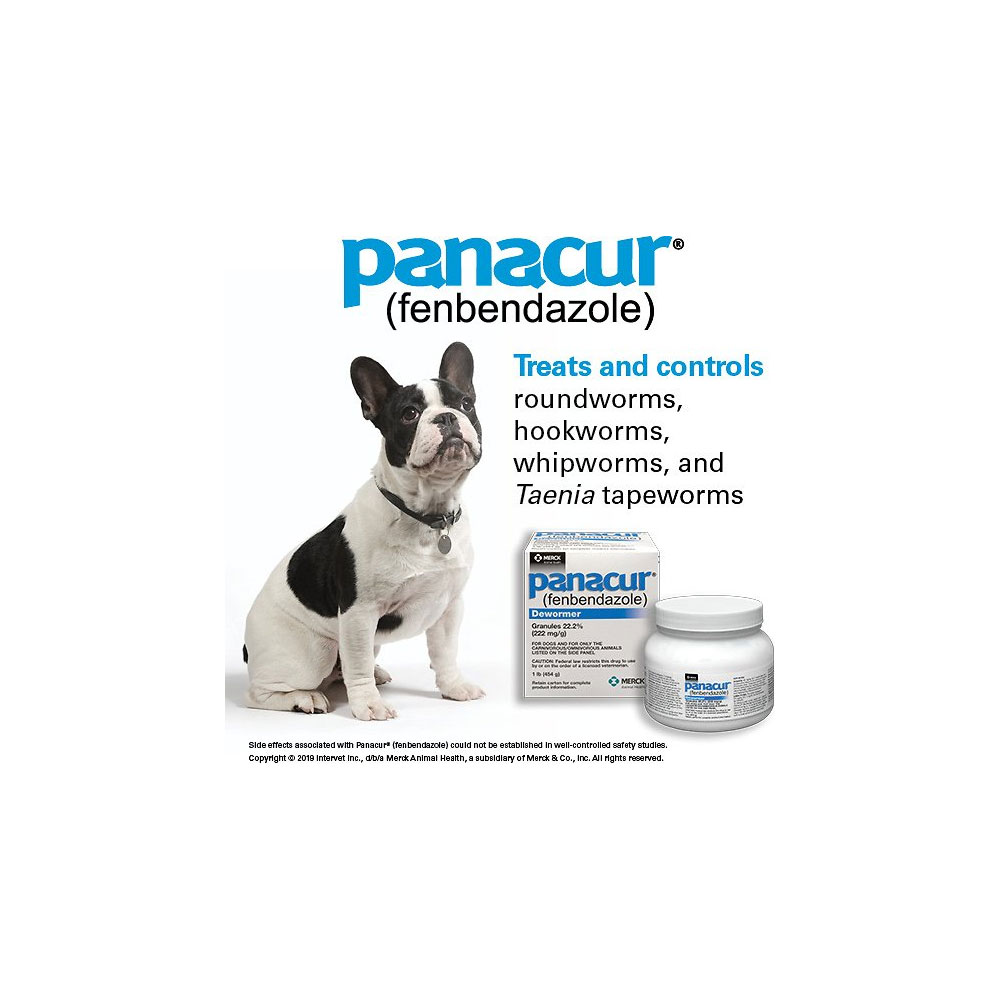SAVE 20% OFF 20% OFF Use Code PREZ20 *
Panacur for Dogs - Granules 22.2% Fenbendazole (1 lb) - [Dewormer]
- Description
- Ingredients
- Directions
- FAQ
- Reviews
Description
Panacur (fendendazole) is prescribed to treat and control hookworms, roundworms, Taenia Tapeworms, whipworms and other parasites in your canine companion. It comes in a convenient powder, which means it can be easily mixed into your dog's usual meals, whether wet or dry, making it easy to treat your pal's symptoms.
Key Benefits
- Controls roundworms, hookworms, whipworms and Taenia tapeworms
- Powder form allows for accurate dosing
- Excellent safety profile
How It Works
Panacur Granules 22.2% is an antiparasitic. It works by inhibiting the energy metabolism of parasites.
Indications
Panacur Granules 22.2% is used for control of the following internal parasites of the families Felidae and Ursidae.
Felidae:
- Lions (Panthera leo). For control of ascarids (Toxocara cati, Toxascaris leonina), hookworms (Ancylostoma spp.).
- Tigers (Panthera tigris). For control of ascarids (Toxocara cati, Toxascaris leonina), hookworms (Ancylostoma spp.).
- Cheetahs (Acinonyx jubatus). For control of ascarids (Toxocara cati, Toxascaris leonina).
- Pumas (Felis concolor), Panthers (Panthera spp.), Leopards (Panthera pardus), Jaguars (Panthera onca). For control of ascarids (Toxocara cati, Toxascaris leonina), hookworms (Ancylostoma spp.), tapeworms (Taenia hydatigena, T. krabbei, T. taeniaeformis).
Ursidae:
- Black Bears (Ursus americanus). For control of ascarids (Baylisascaris transfuga, Toxascaris leonina), hookworms (Ancylostoma caninum), tapeworms (Taenia hydatigena, T. krabbei).
- Polar Bears (Ursus maritimus) and Grizzly Bears (Ursus horribilis). For control of ascarids (Baylisascaris transfuga, Toxascaris leonina).
Panacur Suspension is a registered trademark of Intervet Inc., d/b/a Merck Animal Health, a subsidiary of Merck & Co. Inc.
Ingredients
Active Ingredient
Fenbendazole — 100 mg/mL (10%)
Directions
View Panacur Granules product label.
Efficacy is dependent on the correct dose level based on body weight over the appropriate treatment period. When possible, animals should be weighed to determine body weight accurately, otherwise weights can be estimated.
It is important that the appropriate dose of Panacur be ingested. This may best be accomplished by applying the granules as a top dressing or mixing with a small portion of the food prior to offering the main meal.
Refer to the Dosage and Administration portion of the labeling for determining the appropriate dose for each species of animal.
Administration and Dosage
For dogs: 50 mg/kg (22.7 mg/lb) daily for three consecutive days for the removal of ascarids (Toxocara canis, Toxascaris leonina), hookworms (Ancylostoma caninum, Uncinaria stenocephala), whipworms (Trichuris vulpis) and tapeworms (Taenia pisiformis).
The daily dosage of 50 mg/kg (22.7 mg/lb) can be achieved as follows:
- Using a gram scale, weigh out 1 gram of Panacur (fenbendazole) Granules 22.2% for each 4.44 kg or 10 lbs. body weight.
- Daily dosages must be repeated for three consecutive days.
- Mix the appropriate amount of drug with a small amount of the usual food: dry dog food may require slight moistening to facilitate mixing with the drug.
Caution:
Do not use 14 days before or during the hunting season.
Toxicology Data
Panacur has been fed to pregnant and non-pregnant females and to male animals including Felidae and Ursidae at ten times the recommended dose for twice the recommended treatment period without effect on reproduction. In one puma and one jaguar, ten times the recommended dose given for twice the recommended duration showed evidence of inappetence when administered the Panacur Granules.
Panacur Granules 22.2% did not cause toxicity when administered to weaned pups at doses equal to 5 times the recommended daily dose and for 2 times the duration of treatment.
Side Effects
In studies conducted in a variety of captive animals, loose stools have been reported in pumas, black bears, and ruminants. In one puma and one jaguar, periods of inappetence followed the initial consumption of fenbendazole at ten times the recommended treatment level.
Drug Reactions
There are currently no data available to support the use of Panacur Granules 22.2% in conjunction with other nutritional and drug substances in Felidae and Ursidae. However, experience with the drug under actual conditions of use has not revealed any incompatibilities with Panacur.
Panacur Granules 22.2% has been administered to dogs in clinical trials along with a wide variety of other drugs including antibiotics, steroids, anesthetics, tranquilizers, vitamins, and minerals. No incompatibilities with other drugs are known at this time.
Precautions:
Medicated food must be fully consumed for Panacur to be effective. Dispensing containers must be labeled with drug identification and directions for use.
Adverse Reactions
Another benzimidazole has been reported to cause hepatotoxicity clinically in canines. However, this effect has not been reported during the clinical use of fenbendazole. In US clinical studies, 3 of 240 dogs vomited which may have been drug related.
Storage:
Store at controlled room temperature 68-77°F (20-25°C).
Keep this and all medication out of the reach of children.
FAQ
- Controls roundworms, hookworms, whipworms and certain tapeworms
- Powder form allows for accurate dosing
- Excellent safety profile
Have your veterinarian explain the other treatment options that may be available to treat your pet's condition.
Some intestinal parasites, such as hookworms and roundworms can be spread to people. Talk to your veterinarian about other measures you can take to prevent your pet from being infected with intestinal worms, and protecting yourself.
Notify your veterinarian of any other medications or supplements your pet is receiving. Also tell your veterinarian if your pet has had any reactions to previous medications.
Rare. May see vomiting.
If your pet experiences an allergic reaction to the medication or has a reaction to the dying parasites, signs may include facial swelling, hives, scratching, sudden onset of diarrhea, vomiting, shock, seizures, pale gums, cold limbs, or coma. If you observe any of these signs, contact your veterinarian immediately.










